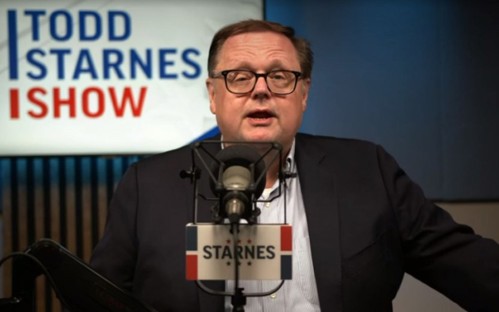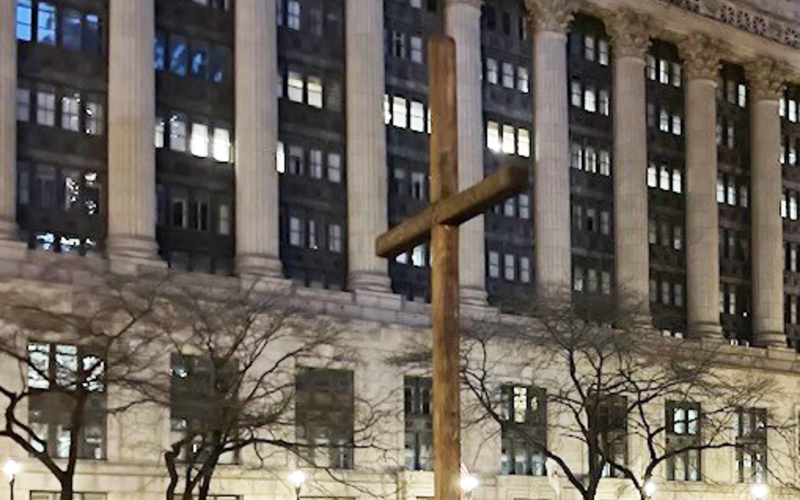Within hours of the death of Pope Francis on Monday, media outlets began churning out profiles of possible successors. Whoever that might be will determine the church’s policy on the rise of Islam in Western Europe, Memphis-based radio host and Newsmax contributor Todd Starnes said on American Family Radio Monday.
Many faith leaders would like to see more conservative messaging and leadership from the Vatican with the next pope.
 “This Pope was quite frankly a communist and … a radical leftist, and there's been a great controversy within the Catholic Church over the direction of the denomination,” Starnes, a Southern Baptist Christian, told show host Jenna Ellis.
“This Pope was quite frankly a communist and … a radical leftist, and there's been a great controversy within the Catholic Church over the direction of the denomination,” Starnes, a Southern Baptist Christian, told show host Jenna Ellis.
Francis was critical of capitalism and neoliberalism, suggesting the free-market system was inadequate in terms of meeting basic human needs. He was critical of the idea of private property as absolute, emphasizing that it should have a social purpose.
|
C.J. Doyle of the Catholic Action League of Massachusetts says Pope Francis' time as head of the Roman Catholic Church was a tumultuous pontificate. 
"This was a very, very controversial, very divisive, very problematic papacy," he tells AFN. "Phil Lawler, who is the editor of Catholic World News, wrote a book describing it as a disastrous papacy." Doyle says in his opinion Pope Francis holds a dubious distinction among his 265 predecessors. "We've had popes who were personally corrupt, we've had popes who were cowardly, popes who were derelict in the performance of their duties – but really, in 2,000 years we've never had a pope who was at enmity with the traditional moral teachings of the Catholic Church." Francis, 88, was elected on March 13, 2013. He was the first Latin American pope. |
He had mixed opinions on the transgender movement, calling it the “worst danger” of modern times and decrying the trend of “erasing all differences” between man and woman. The transgender movement is “this ugly ideology of our time,” Francis told National Catholic Reporter last year.
Yet instead of admonishing and encouraging a different lifestyle for transgenders, Francis in November of 2023 called for their inclusion in Catholic Church practices. He approved new policies that allowed for baptism for transgenders, blessed them as godparents and as witnesses at Catholic weddings.
Those policies came as many bishops in the U.S. were trying to limit the movement within the church with guidelines seeking to stop Catholic hospitals from providing gender manipulation procedures and therapy.
A 14-page document issued in March of 2023 – “Moral Limits to the Technological Manipulation of the Human Body” – instructed Catholic hospitals “must not perform interventions, whether surgical or chemical, that aim to transform the sexual characteristics of a human body into those of the opposite sex or take part in the development of such procedures.”
The U.S. Conference of Catholic Bishops governs Catholic health services.
Will conclave go conservative this time?
For better are worse, “the Catholics are at the forefront of a lot of these cultural issues of the day, and they also hold the distinction of being the largest religious body within the United States,” Starnes pointed out.
“I think there’s going to be an effort to see the pendulum swing back a little bit; but again, that really depends on the cardinals,” he added.
Francis has appointed enough cardinals to create a supermajority for the liberal wing of the coming conclave, the gathering of cardinals that will select his successor, Religion News reported in 2023.
The news outlet also notes that Francis was elected by a conclave assembled mostly by Popes Benedict XVI and John Paul II, both staunch conservatives.
As far as the direction of the Catholic Church, there’s only one correct way, former priest Frank Pavone told Ellis.

“There can only be one direction, and that is Jesus Christ. He is the head of the Church. Everything that any church teaches has to be in accordance with the Word of God,” Pavone said. “The Word of God is living and active, and the beautiful thing is it's public. Christianity is not and has never been a religion where you've got secret knowledge on the part of just a few elites.”
Francis & the rise of Islam
For his part, Francis sought to soften the topic of violence within the discussion of Islam in Western Europe. He was hesitant to focus on the violent activities of Islamic groups such as Hamas, instead drawing other faiths under the big tent of terrorism.
In a 2016 interview, Francis stated that if there was “fear” of Islam when considering the terror group ISIS that believers should admit the group’s objectives are only “partly drawn from Islam.” Francis then suggested that Jesus’ instructions to his disciples to “make disciples of all nations” could be interpreted as support for violence.
The number of Western Europeans who identify as Islamic is believed to exceed 50 million, which would represent approximately 7.1% of the population. The numbers are highest in France where approximately 5.7 million Muslims would make up 8.8% of the population.
“One other thing that's interesting is the Islamification of Western Europe; and that has been a big issue. There's been some reporting on it here in America, but that is a major issue, and there are actually calls for the next pope to be someone who will fiercely defend Western Europe from the rise of the Islamists,” Starnes shared.
Pavone has no problem if Pope Francis’ teachings were sometimes confusing.
“It’s okay to be confused about what the pope says. You never have to be confused about what the faith says,” Pavone said. “He has the same information that we do. Jesus said, 'I have spoken openly to all the world.' So, [Jesus] has set the direction for us, and this is what we need to pray: that the next pope will be squarely and solidly in line with that.”







